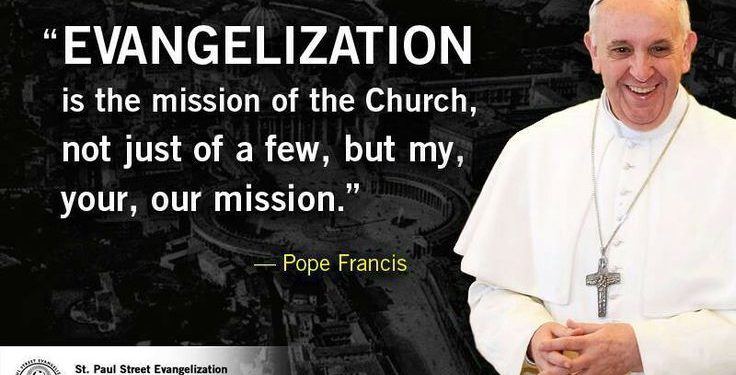Evangelism in 2016 And Beyond

Pope Paul VI wrote what may well be the greatest single work ever written on evangelism in his Apostolic Exhortation, Evangelii Nuntiandi, promulgated December 8, 1975. This one letter informs, inspires, and challenges us in ways unparalleled and serves as the perennial document on the topic of evangelization that should be our guide for evangelism in 2016 and beyond.
Among the many points we could discuss in this great letter, here are six that I’ve excised that I consider to be absolutely crucial for all of us who are engaged in evangelism today:
Point #1: Evangelism is not a nice option for Catholics!
In paragraph 5, Our Holy Father hammers the point:
Such an exhortation [to evangelism] seems to us to be of capital importance, for the presentation of the Gospel message is not an optional contribution for the Church. It is the duty incumbent on her by the command of the Lord Jesus, so that people can believe and be saved. This message is indeed necessary. It is unique. It cannot be replaced. It does not permit either indifference, syncretism or accommodation. It is a question of people’s salvation. It is the beauty of the Revelation that it represents. It brings with it a wisdom that is not of this world. It is able to stir up by itself faith—faith that rests on the power of God. It is truth. It merits having the apostle consecrate to it all his time and all his energies, and to sacrifice for it, if necessary, his own life.
In fact, in paragraph 59, Pope Paul declares evangelism as to be a “Basic Duty” of each and every one of the people of God.
In paragraphs 13-14:
Those who have received the Good News and who have been gathered by it into the community of salvation can and must communicate and spread it. (14) The Church knows this. She has a vivid awareness of the fact that the Savior’s words, “I must proclaim the Good News of the kingdom of God,” apply in all truth to herself: She willingly adds with St. Paul: “Not that I boast of preaching the gospel, since it is a duty that has been laid on me; I should be punished if I did not preach it” It is with joy and consolation that at the end of the great Assembly of 1974 we heard these illuminating words: “We wish to confirm once more that the task of evangelizing all people constitutes the essential mission of the Church.” It is a task and mission which the vast and profound changes of present-day society make all the more urgent. Evangelizing is in fact the grace and vocation proper to the Church, her deepest identity. She exists in order to evangelize…
I love the way His Holiness brings in St. Paul’s famous line from I Cor. 9:15-16, “Woe be unto me if I preach not the Gospel, for necessity is laid upon me!” Prophets are great at declaring “woe” on everybody else! “Woe” represents the divine oracle of judgment. This immediately brings to mind the Prophet Isaiah. The Book of Isaiah is laden with “woes” all over the place aimed at Israel as well as the surrounding nations. But notice when Isaiah has a revelation of God and “sees” the Lord, he says, “woe is me” in Is. 6:1-9:
In the year that King Uzzi’ah died I saw the Lord sitting upon a throne, high and lifted up; and his train filled the temple. Above him stood the seraphim; each had six wings: with two he covered his face, and with two he covered his feet, and with two he flew. And one called to another and said: “Holy, holy, holy is the LORD of hosts; the whole earth is full of his glory.” And the foundations of the thresholds shook at the voice of him who called, and the house was filled with smoke. And I said: “Woe is me! For I am lost; for I am a man of unclean lips, and I dwell in the midst of a people of unclean lips; for my eyes have seen the King, the LORD of hosts!” Then flew one of the seraphim to me, having in his hand a burning coal which he had taken with tongs from the altar. And he touched my mouth, and said: “Behold, this has touched your lips; your guilt is taken away, and your sin forgiven.” And I heard the voice of the Lord saying, “Whom shall I send, and who will go for us?” Then I said, “Here am I! Send me.” And he said, “Go, and say…”
St. Paul “sees the Lord” in his calling to evangelize. And just as Isaiah before him, he exclaims “Woe is me!”
Perhaps the reason we don’t evangelize as we should today is we fail to see the awesome nature of the call!
Point #2: This Apostolic Exhortation Dispels Myths!
In paragraph 21, Pope Paul proclaims what we have re-learned all too painfully with the advent of the recent priest scandals: If we do not live the message, our message will not be heard!
Above all the Gospel must be proclaimed by witness. Take a Christian or a handful of Christians who, in the midst of their own community, show their capacity for understanding and acceptance, their sharing of life and destiny with other people, their solidarity with the efforts of all for whatever is noble and good… Such a witness is already a silent proclamation of the Good News and a very powerful and effective one. Here we have an initial act of evangelization…
Now here comes the myth-buster. How many of us have heard the line famously and falsely attributed to St. Francis of Assisi, “Preach the Gospel, use words when necessary?” Not only did St. Francis never say that, unfortunately, that line is often used today as an excuse to avoid evangelizing with words as well as deeds! Paragraph 22 quickly and decisively dispatches that myth!
Nevertheless this [silent witness] always remains insufficient, because even the finest witness will prove ineffective in the long run if it is not explained, justified – what Peter called always having “your answer ready for people who ask you the reason for the hope that you all have” – and made explicit by a clear and unequivocal proclamation of the Lord Jesus. The Good News proclaimed by the witness of life sooner or later has to be proclaimed by the word of life. There is no true evangelization if the name, the teaching, the life, the promises, the kingdom and the mystery of Jesus of Nazareth, the Son of God are not proclaimed.
Point #3: We must evangelize in keeping with our vocation:
And virtually all vocations are mentioned.
Paragraph 60 emphasizes that each act of evangelism, no matter how isolated it may seem must be seen as “deeply ecclesial.” Paragraphs 63-69 emphasize the fact that individual churches in the Church, religious, etc. each bring their needed charisms to the Universal Church to build up the body of Christ, and 65-69 emphasizes all must be done in union with the Vicar of Christ, the successor of St. Peter. That should go without saying. But for our purpose here I would like to move down to paragraph 70, which shifts the focus to the lay vocation:
Lay people, whose particular vocation places them in the midst of the world and in charge of the most varied temporal tasks, must for this very reason exercise a very special form of evangelization.
Their primary and immediate task is not to establish and develop the ecclesial community- this is the specific role of the pastors- but to put to use every Christian and evangelical possibility latent but already present and active in the affairs of the world. Their own field of evangelizing activity is the vast and complicated world of politics, society and economics, but also the world of culture, of the sciences and the arts, of international life, of the mass media. It also includes other realities which are open to evangelization, such as human love, the family, the education of children and adolescents, professional work, suffering. The more Gospel-inspired lay people there are engaged in these realities, clearly involved in them, competent to promote them and conscious that they must exercise to the full their Christian powers which are often buried and suffocated, the more these realities will be at the service of the kingdom of God and therefore of salvation in Jesus Christ, without in any way losing or sacrificing their human content but rather pointing to a transcendent dimension which is often disregarded.
Wow! Did you catch that word, “suffering?” In every area of life and even in death and suffering, there are opportunities to evangelize. In suffering well, we evangelize. In proclaiming the truth about human dignity in suffering, we evangelize. That could be an entire article in and of itself!
Point #4: The Importance of Truth!
Paragraph 78
The Gospel entrusted to us is also the word of truth. A truth which liberates and which alone gives peace of heart is what people are looking for when we proclaim the Good News to them. The truth about God, about man and his mysterious destiny, about the world; the difficult truth that we seek in the Word of God and of which, we repeat, we are neither the masters nor the owners, but the depositaries, the heralds and the servants.
Every evangelizer is expected to have a reverence for truth, especially since the truth that he studies and communicates is none other than revealed truth and hence, more than any other, a sharing in the first truth which is God Himself. The preacher of the Gospel will therefore be a person who even at the price of personal renunciation and suffering always seeks the truth that he must transmit to others. He never betrays or hides truth out of a desire to please men, in order to astonish or to shock, nor for the sake of originality or a desire to make an impression. He does not refuse truth. He does not obscure revealed truth by being too idle to search for it, or for the sake of his own comfort, or out of fear. He does not neglect to study it. He serves it generously, without making it serve him.
Enough said.
Point #5: No excuses and a Solemn Warning!
Paragraph 80:
Our appeal here is inspired by the fervor of the greatest preachers and evangelizers, whose lives were devoted to the apostolate. Among these we are glad to point out those whom we have proposed to the veneration of the faithful during the course of the Holy Year. They have known how to overcome many obstacles to evangelization.
Such obstacles are also present today, and we shall limit ourself to mentioning the lack of fervor. It is all the more serious because it comes from within. It is manifested in fatigue, disenchantment, compromise, lack of interest and above all lack of joy and hope. We exhort all those who have the task of evangelizing, by whatever title and at whatever level, always to nourish spiritual fervor.
This fervor demands first of all that we should know how to put aside the excuses which would impede evangelization. The most insidious of these excuses are certainly the ones which people claim to find support for in such and such a teaching of the Council.
Thus one too frequently hears it said, in various terms, that to impose a truth, be it that of the Gospel, or to impose a way, be it that of salvation, cannot but be a violation of religious liberty. Besides, it is added, why proclaim the Gospel when the whole world is saved by uprightness of heart? We know likewise that the world and history are filled with “seeds of the Word”; is it not therefore an illusion to claim to bring the Gospel where it already exists in the seeds that the Lord Himself has sown?
Anyone who takes the trouble to study in the Council’s documents the questions upon which these excuses draw too superficially will find quite a different view.
It would certainly be an error to impose something on the consciences of our brethren. But to propose to their consciences the truth of the Gospel and salvation in Jesus Christ, with complete clarity and with a total respect for the free options which it presents- “without coercion, or dishonorable or unworthy pressure”- far from being an attack on religious liberty is fully to respect that liberty, which is offered the choice of a way that even non-believers consider noble and uplifting. Is it then a crime against others’ freedom to proclaim with joy a Good News which one has come to know through the Lord’s mercy? And why should only falsehood and error, debasement and pornography have the right to be put before people and often unfortunately imposed on them by the destructive propaganda of the mass media, by the tolerance of legislation, the timidity of the good and the impudence of the wicked? The respectful presentation of Christ and His kingdom is more than the evangelizer’s right; it is his duty. It is likewise the right of his fellow men to receive from him the proclamation of the Good News of salvation. God can accomplish this salvation in whomsoever He wishes by ways which He alone knows. And yet, if His Son came, it was precisely in order to reveal to us, by His word and by His life, the ordinary paths of salvation. And He has commanded us to transmit this revelation to others with His own authority. It would be useful if every Christian and every evangelizer were to pray about the following thought: men can gain salvation also in other ways, by God’s mercy, even though we do not preach the Gospel to them; but as for us, can we gain salvation if through negligence or fear or shame- what St. Paul called “blushing for the Gospel” (quoting Romans 1:16—I am not ashamed…)- or as a result of false ideas we fail to preach it? For that would be to betray the call of God…
Point #6: Brass Tacks
Paragraph 18:
For the Church, evangelizing means bringing the Good News into all the strata of humanity, and through its influence transforming humanity from within and making it new: “Now I am making the whole of creation new” (Rev. 21:5). But there is no new humanity if there are not first of all new persons renewed by Baptism and by lives lived according to the Gospel.
This idea of “bringing the Gospel into all the strata of humanity” is peppered throughout Pope Paul Vi’s exhortation and is, in simple terms, another way of saying we are called to be “leaven” (see Matt. 13:33). In paragraph 53, Pope Paul says we must evangelize those who have not heard the Gospel. In paragraph 54, Those who have heard, be they in the Church or our separated brethren. Here we have “the New Evangelization” before “the New Evangelization.” In paragraph 55, we must evangelize unbelievers and skeptics. In paragraph 56, Catholics who do not practice the Faith. In paragraph 59, His Holiness calls us to do so in small associations, small groups. We must become “all things to all men, that by all means we may save some!” (I Cor. 9:22). The Catechism of the Catholic Church, 900, immediately comes to mind:
Since, like all the faithful, lay Christians are entrusted by God with the apostolate by virtue of their Baptism and Confirmation, they have the right and duty, individually or grouped in associations, to work so that the divine message of salvation may be known and accepted by all men throughout the earth. This duty is the more pressing when it is only through them that men can hear the Gospel and know Christ. Their activity in ecclesial communities is so necessary that, for the most part, the apostolate of the pastors cannot be fully effective without it.
According to Pope Paul VI, our calling is most clear. The task is daunting, yet we know the Lord is with us. He will never fail to strengthen us for the task. All we have to do is ask… and engage.
If you enjoyed this and would like to get the necessary tools to evangelize, click here.






